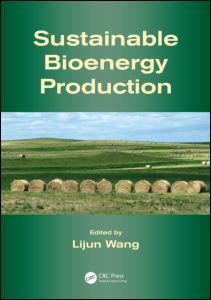Description
Sustainable Bioenergy Production
Language: English
Subjects for Sustainable Bioenergy Production:
Keywords
Moisture Content; Sweet Sorghum; Sustainable energy; Hydrothermal Liquefaction; Bioenergy; Ad; Biomass; Te Ch; Energy feedstock; Bioenergy Systems; Biorefinery; Energy Balances; Biofuel; Life Cycle Assessment; Bio-oil Yield; Biomass Feedstock; Ethanol Fermentation; Biomass Gasication; Food Processing Wastes; Ethanol Production; Biodiesel Production; CHP Plant; Study Case; Uidized Bed; CHP System; Prime Mover; Lignocellulosic Biomass; Sustainable Bioenergy Production; Biomass CHP; Sweet Sorghum Bagasse; Steam
Support: Print on demand
Description
/li>Contents
/li>Biography
/li>
Given the environmental concerns and declining availability of fossil fuels, as well as the growing population worldwide, it is essential to move toward a sustainable bioenergy-based economy. However, it is also imperative to address sustainability in the bioenergy industry in order to avoid depleting necessary biomass resources. Sustainable Bioenergy Production provides comprehensive knowledge and skills for the analysis and design of sustainable biomass production, bioenergy processing, and biorefinery systems for professionals in the bioenergy field.
Focusing on topics vital to the sustainability of the bioenergy industry, this book is divided into four sections: Fundamentals of Engineering Analysis and Design of Bioenergy Production Systems, Sustainable Biomass Production and Supply Logistics, Sustainable Bioenergy Processing, and Sustainable Biorefinery Systems. Section I covers the fundamentals of genetic engineering, novel breeding, and cropping technologies applied in the development of energy crops. It discusses modern computational tools used in the design and analysis of bioenergy production systems and the life-cycle assessment for evaluating the environmental sustainability of biomass production and bioenergy processing technologies.
Section II focuses on the technical and economic feasibility and environmental sustainability of various biomass feedstocks and emerging technologies to improve feedstock sustainability. Section III addresses the technical and economic feasibility and environmental sustainability of different bioenergy processing technologies and emerging technologies to improve the sustainability of each bioenergy process. Section IV discusses the design and analysis of biorefineries and different biorefinery systems, including lignocellulosic feedstock, whole-crop, and green biorefinery.
Section I Fundamentals of Engineering Analysis and Design of Bioenergy Production Systems. Genetic Engineering of Bioenergy Crops toward High Biofuel Production. Novel Cropping Technologies and Management Applied to Energy Crops. Mathematical Modeling in Biomass and Bioenergy Systems. Life-Cycle Assessment of Bioenergy Systems. Sustainability of Bioenergy Systems. Section II Sustainable Biomass Production and Supply Logistics. Production and Supply Logistics of Microalgae as an Energy Feedstock. Production and Supply Logistics of Switchgrass as an Energy Feedstock. Production and Supply Logistics of Sweet Sorghum as an Energy Feedstock. Production and Supply Logistics of Sugarcane as an Energy Feedstock. Crop Residues as an Energy Feedstock: Availability and Sustainability. Woody Biomass as an Energy Feedstock: Availability and Sustainability. Animal Wastes as an Energy Feedstock: Availability and Sustainability. Municipal Solid-Waste Management Strategies for Renewable Energy Options. Food Processing Wastes as an Energy Feedstock: Availability and Sustainability. Section III Sustainable Bioenergy Processing. Fermentation in Transportation Alcohols. Biodiesel Production from Waste Feedstock. Biomass Gasification and Syngas Utilization. Biomass Pyrolysis and Bio-oil Utilization. Hydrothermal Liquefaction of Biomass. Anaerobic Digestion of Organic Wastes. Combined Heat and Power Generation from Biomass. Section IV Sustainable Biorefinery Systems. Biorefinery Principles, Analysis, and Design. Lignocellulosic Feedstock Biorefinery. Whole-Crop Biorefinery. Green Biorefinery. Index.
Dr. Lijun Wang is an associate professor of biological engineering at North Carolina Agricultural and Technical State University, Greensboro. He has 20 years experience as a process engineer working in the fields of bioenergy and energy efficiency technologies. His current research interests are in bioenergy processing technologies, wastes-to-energy technologies, and computational process engineering. He has published 2 books and 17 book chapters, and over 55 peer-reviewed journal articles and has given more than 60 conference presentations. Dr. Wang is a licensed professional engineer in North Carolina and Nebraska and a certified energy manager with the Association of Energy Engineers.




